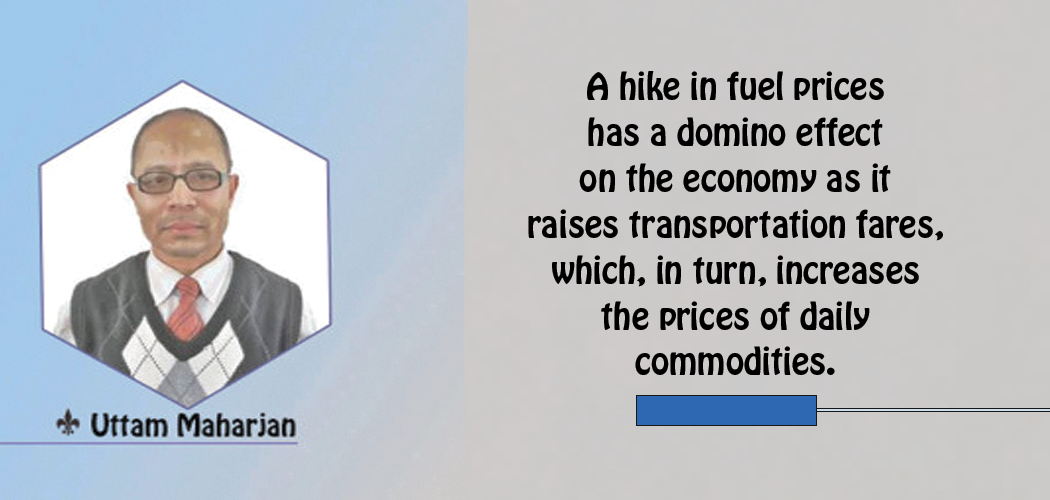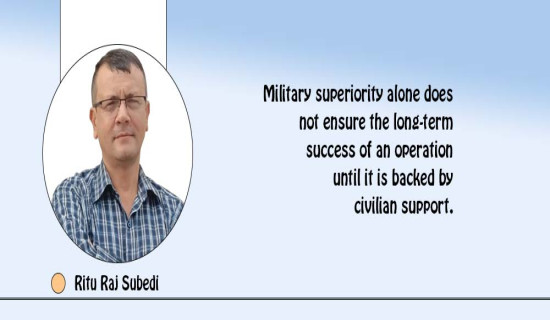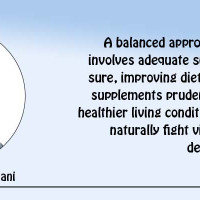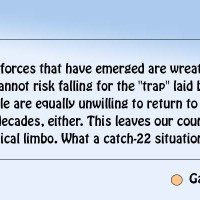- Monday, 12 January 2026
A Good Gesture Of Government
Uttam Maharjan
Nepal Oil Corporation has been constantly hiking prices of POL products and LP gas for the last few months. Last week, the government oil monopoly hiked the price of petrol by Rs. 21 per litre and the price of diesel oil and kerosene (paraffin oil) by Rs. 27 per litre each. Likewise, the price of aviation fuel for domestic airlines was increased by Rs. 19 per litre, whereas the price of aviation fuel for international airlines was increased by USD 100 per kilolitre. With this, petrol cost Rs. 199 per litre, and diesel oil and kerosene Rs. 192 per litre each.
This led to widespread protests in the streets. The price hike was also opposed by some members of Parliament. The main opposition party, CPN-UML, declared protests both in Parliament and in the streets not only against the fuel price hikes but also increasing prices of other commodities. Construction entrepreneurs expressed their concern that it might be very difficult for them to operate their businesses as fuel prices keep on going up. Amid growing protests, the government has decided to reduce tax on petrol by Rs. 20 per litre and on diesel oil and kerosene by Rs. 29 per litre each. Now, petrol costs Rs. 179 per litre, diesel oil and kerosene Rs. 163 per litre each, fuel for domestic airlines Rs. 185 per litre and fuel for international airlines USD 1,645 per kilolitre. The price of LP gas remains constant at Rs. 1,800 per cylinder.
Protests
POL products and LP gas are not produced in Nepal. They have to be imported from India. Indian Oil Corporation is the sole supplier of POL products and LP gas for the country. Whenever fuel prices are hiked, protests erupt in some cases. Whenever fuel prices are hiked, NOC argues that such price hikes are a compulsion. The argument of the corporation is that fuel prices in Nepal fluctuate according to variations in the prices of fuel in the international market. Now, NOC blames the Ukraine war for skyrocketing prices of POL products and LP gas and surmises that the prices will further increase in the days to come.
The Ukraine war erupted on February 24 and is continuing with no sign of an end in sight. On February 20 just before the start of the war, in Kathmandu, the price of petrol was Rs. 145 per litre, which increased to Rs. 199 on June 20. If we look at the price trend of Brent crude, it was USD 97.13 per barrel in February, which has now increased to USD 110.29 per barrel. NOC says it will have to bear a loss of Rs. 4.7 billion per month. Its accumulated loss is expected to reach Rs. 55 billion by the end of June. Its dues to IOC stand at Rs. 22 billion.
Fuel prices are sensitive. A hike in fuel prices has a domino effect on the economy as it raises transportation fares, which, in turn, increases the prices of daily commodities. As a result of price hikes in fuel, transportation fares, including air fares, have increased. The prices of daily commodities have also increased. Price hikes are not a good omen. As per Nepal Rastra Bank, the year-on-year consumer price inflation reached 7.87 per cent in May as against 3.65 in May 2021.
According to Minister for Industry, Commerce and Supplies Dilendra Prasad Badu, hikes in fuel prices have constantly occurred since 2071 BS. He has said that a high-level task force will be formed to recommend measures for a smooth, systematic, transparent and effective supply of POL products and LP gas. It will also recommend short-term and long-term policies and policy-level legal and institutional reform measures.
Whatever justifications NOC gives for hikes in fuel prices, the people are not ready to buy the justifications. They are fed up with fuel price hikes. They are finding it difficult to manage expenses owing to fuel price hikes. In the market, the prices of almost all commodities are increasing. This has made the life of people, especially low-income people, miserable.
NOC is suspected of being bogged down in mismanagement and corruption. The NOC staff are enjoying good privileges. Even if the corporation is portrayed as a loss-bearing entity, no staff wants to leave the corporation. The system of free distribution of fuel, along with alleged mismanagement and corruption, is an anomaly that has worsened the financial condition of the corporation.
Respite
NOC says it is not in a condition to reduce fuel prices as the prices are based on the list of prices sent by IOC and government taxes. This time, the government has provided some respite for the people by slashing tax on petrol, diesel oil and kerosene. However, no taxes were reduced on LP gas and aviation fuel. It is the duty of the government to provide some relief for the people under unfavourable circumstances. The government claims that it espouses public welfare as one of its guiding principles. It should have reduced taxes on other fuels as well.
In fact, the government collects huge taxes on fuel from NOC. During the 11 months of this fiscal year, fuel imports reached Rs. 290 billion and the government collected taxes to the tune of Rs. 110 billion. If fuel prices keep on rising, the economy as a whole may be affected. The rise in the prices of daily commodities as a result of fuel price hikes will exacerbate inflation, making the life of the general public difficult. The country may not be in a condition to cope with runaway inflation. This gesture of the government of providing some respite for the people by reducing taxes on petrol, diesel oil and kerosene is praiseworthy. The government should show such a gesture in the future as well.
(Maharjan has been regularly writing on contemporary issues for this daily since 2000. uttam.maharjan1964@gmail.com)









-(1)-original-thumb.jpg)






